.
Marijana Radev (im Westen Marianna Radev) zählte zu den großen Altistinnen der Nachkriegszeit, die – aus Rumänien stammend und in Zagreb verwurzelt – in Italien und vor allem auch in Deutschland/Berlin sich einen bedeutenden Namen gemacht hat. Sie war eine gesuchte Größe bei internationalen Festspielen, und ist Sammlern mit ihren Auftritten bei Live-Aufnahmen in Italien (Pique Dame, Mazeppa u. a.) sowie von solchen unter Böhm oder Fricsay (besonders dessen Verdi-Requiem-Einspielung oder auch ihre Orff-Aufnahmen bei DG) in Erinnerung wegen ihrer satten, ausdrucksvollen und scheinbar in der Tiefe nie endenwollender Altstimme. Ihr Repertoire war weitgestreut und eklektisch, und namentlich ihre Liedaufnahmen zeigen die emotionale wie interterpretaorische Reife der Künstlerin.
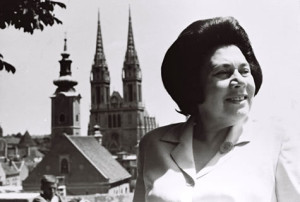
Marijanna Radev/Hr.Radio
Im Folgenden gibt es einen etwas gewöhnungsbedürftigen, weil sehr lyrisch-wörtlich aus dem Kroatischen übersetzten englischsprachigen Text aus der kürzlich erschienenen 2-CD-Gedenkausgabe zum 100. Geburtstag und 40. Todestag der Sängerin, die bei der Kroatischen Firma HRT Croatian Records (www.crore.hr) herausgekommen ist – sie enthält in überwiegend kroatischen Radioaufnahmen Opernarien aus den Kernrepertoire der Altistin von Monteverdi bis zu zeitgenössischen kroatischen Komponisten auf CD1 und Lieder von Brahms, Schumann oder Strauss bis zu Gotovac auf CD2. Hier liegt ein umfangreiches Kompendium des weiten Spektrums dieser Ausnahmestimme vor. Die Beschaffung mag ein wenig schwierig sein – die Wege in der EU sind nicht immer die widerstandfreiesten. Aber hier gibt´s noch eine Bezugsquelle in Zagreb… (G. H.)
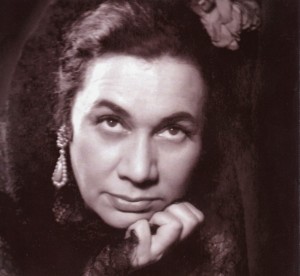
als Carmen/HRT
Marijana Radev: Thinking about the creative world of the great ones, it seems that we get immersed in some mysterious space of production of ideas whose infinity permanently secures the spiritual horizon necessary for the survival for all those who touch this world looking for the sense of one’s own duration in this touch. What has to be said first is that the thought about the unrepeatable interpretations, about the unique voice whose beauty was retained in the memory as an essence of the musical substance, all of it seems more important than the sifting among the meagre data about the course of the life of Marijana Radev (Constanta, Romania, November 21, 1913 – Zagreb, September 17, 1973), which somehow points out that whatever was essential in her life was oriented towards music. If one follows the unrepeatable line of the life of one of the greatest interpreters of the 20th century, there will be only few data – except the preserved interpretations – that would support and contribute to the comprehension of her artistry.
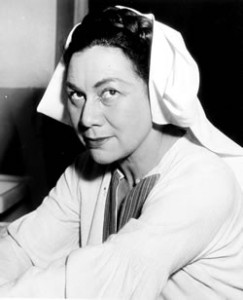
In Gotovacs „Ero der Schelm“/buh
Marijana Radev was born in the family of the father originating from Bulgaria and the Croatian mother from Bakar. The family found themselves in Romania when Marijana was born due to their working commitment. Thus Marijana was born in Constanta, a beautiful town on the coast of the Black Sea. Owing to the political circumstances that in the second decade of the 20th century in Romania, the family moved to Zagreb, the homeland of Marijana’s mother. This is where Marijana Radev received her education, first learning playing the piano, and after that she learned singing with professor Marija Kostrencic. She did not complete her studies in Zagreb, deciding to continue her studies in Trieste where she completed her studies in four years. There are few notes left that prove about her appearances during her time spent on studies in Zagreb. One of these notes was found in the family archive, which mentioned the appearance at the performance of Lied von der Erde by Gustav Mahler, prepared by Bozidar Kunc (der Lehrerin auch von Zinka Milanov/G. H.).
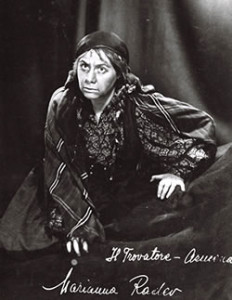
als Azucena/buh
The official opera chronics, on the other hand, mention the Trieste debut in 1938 of Marijana’s role of Marina in the opera Boris Godunov by M.P. Musorgsky, and also the Zagreb debut on September 22 of the same year when she appeared in the role of Santuzza in the Cavalleria Rusticana by Mascagni. However, another small note mentions the year 1937 and the appearance in Ancona of the same opera, but in the role of Lola.
As a matter of fact, what is more important than these beginning details are all the other events that occurred in the course of the following decades. It can be said that the growth of one really great singing career in Italy starts almost simultaneously in Croatia as well, because she appeared often there in the forties. However, due to the war occurrences she returned to Zagreb and was engaged in the Croatian National Theatre. In 1950
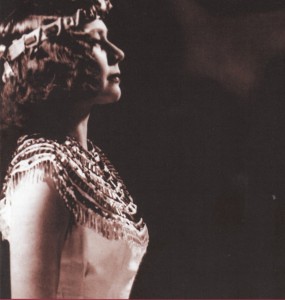
als Amneris/HRT
She continued with international successes and building up her career which Marijana Radev led through some fifty opera roles and through numerous great opera stages all over Europe and outside. With the same intensity she achieved her success on the concert stages with a line of concert creations in great vocal- instrumental works and excellent interpretations of solo songs of the great masters of the Lied, specifically Johannes Brahms’s songs.
One chronicler preciously wrote down that she „integrated all the eminent characteristics of the strong artistic personality, intense feeling for the rhythm, refined musicality, high culture, which along with the voice of specific dark nuances and prominent actor’s gift makes her creations immortal and rather difficult to repeat“. With such characteristics she conquered the great world opera and concert stages for decades. Travelling took her from Covent Garden and Milan La Scala, to the Vienna National Opera, the Opéra Comique in Paris, all through to opera houses and concert stages in Rome, Florence, Parma, Cairo, Jerusalem, Tel Aviv, Dublin, Stockholm, Helsinki, Berlin, Stuttgart, Munich, Zurich and so on. And yet, she always returned to the Opera of the Croatian National Theatre in Zagreb, where she remained true to all the decades of her career and where she realized almost six hundred appearances. This is why even today the Zagreb’s interpretations of the Countess in the Queen of Spades by Tchaikovsky, Azucena in theTrovatore by Verdi, Carmen etc. are remembered.
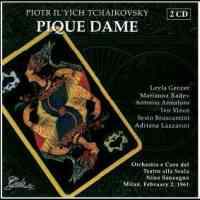 On her artistic way she cooperated with many musical great men of the past century. In the series of great conductors (Mario Rossi, Guido Cantelli, Carlo Maria Giulini, Karl Böhm, Herbert von Karajan, Wolfgang Sawallisch, Lovro von Matacic, Milan Horvat…) it seems that she preferred Ferenc Fricsay with whom she realized many excellent creations among which it is important to mention the twelve performances of Verdi’s Requiem and the same number of Handel’s oratorio Judas Maccabaeus in Israel.
On her artistic way she cooperated with many musical great men of the past century. In the series of great conductors (Mario Rossi, Guido Cantelli, Carlo Maria Giulini, Karl Böhm, Herbert von Karajan, Wolfgang Sawallisch, Lovro von Matacic, Milan Horvat…) it seems that she preferred Ferenc Fricsay with whom she realized many excellent creations among which it is important to mention the twelve performances of Verdi’s Requiem and the same number of Handel’s oratorio Judas Maccabaeus in Israel.
She was a great star of her time, so that she shared her place on the stage with her equals such as Magda Olivero, Maria Stader, Kim Borg, Boris Christoff, Ettore Bastianini, Josef Greindl and the like. She sung in six languages, of course in Croatian, thus indebting the national musical creation by a great number of anthological performances.
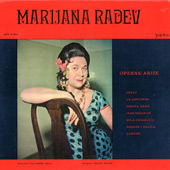 With all this, as a veritable artist she never made differences between the important and less important performances. Each meeting with the public was a reason for an artistic act and each stage and occasion was equally important. She visited many Croatian towns, festivals and marked a number of important dates. One of the remembered ones was the participation on the concert after the festivity due to the establishing of the branch of the Matica Hrvatska in Drnis in 1971 when she performed accompanied by the pianist Stjepan Radic. The great festivity was visited by Vlado Gotovac, Srecko Lipovcan and Zvonimir Komarica. In this time Marijana Radev attached part of her artistic destiny to the Croatian musical creation. Since she as a eighteen-year old girl appeared for the first time in Zagreb (1931) in the premiere of the musical play Christmas Story composed by Rudolf Matz (1901 – 1988) all through to her too early death, she all the time dealt with the Croatian music. Next year Matz, impressed by her, later dedicated Pricalice (Stories) for alto and piano to her, and in 1939 she was given by Jakov Gotovac (1895 – 1982) his confidence and conducted his composition in the Croatian Music Institute. He conducted his ballade Mladi Mjesec (New Moon) for alto and small orchestra, op. 7 and also Pjesme ceznuca (Songs of Yearning) op. 21.
With all this, as a veritable artist she never made differences between the important and less important performances. Each meeting with the public was a reason for an artistic act and each stage and occasion was equally important. She visited many Croatian towns, festivals and marked a number of important dates. One of the remembered ones was the participation on the concert after the festivity due to the establishing of the branch of the Matica Hrvatska in Drnis in 1971 when she performed accompanied by the pianist Stjepan Radic. The great festivity was visited by Vlado Gotovac, Srecko Lipovcan and Zvonimir Komarica. In this time Marijana Radev attached part of her artistic destiny to the Croatian musical creation. Since she as a eighteen-year old girl appeared for the first time in Zagreb (1931) in the premiere of the musical play Christmas Story composed by Rudolf Matz (1901 – 1988) all through to her too early death, she all the time dealt with the Croatian music. Next year Matz, impressed by her, later dedicated Pricalice (Stories) for alto and piano to her, and in 1939 she was given by Jakov Gotovac (1895 – 1982) his confidence and conducted his composition in the Croatian Music Institute. He conducted his ballade Mladi Mjesec (New Moon) for alto and small orchestra, op. 7 and also Pjesme ceznuca (Songs of Yearning) op. 21.
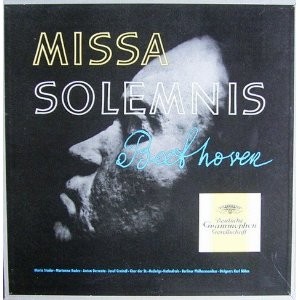 Probably these Songs had her first performance in Croatia because they were composed in this year and earlier premiered in Wiesbaden. This confidence was obviously permanent because Marijana Radev appeared not only in repeat performances of Gotovac’s operas (Doma in Ero s onog svijeta (Ero the Joker), Woman Cowherd in Morana) but had the title role in the premiere performance of the opera Mila Gojsalica in the year 1952, of course conducted by the composer. It was a similar case with Ivan Brkanovic (1906 – 1987) with whom she first met in 1940 in the performance of his Triptihon, the folk ritual accompanying death. Afterwards she participated in the premieres of his operas, interpreting the role of Jela in the Equinox (1950) and Barbara in the Zlato Zadra (Gold of Zadar) (1954). The people familiar with the opera opportunities of that time remember that he dedicated his last (unfinished) opera Fedra to Marijana, but the performance have neither the composer nor his soloist been able to meet. It is not unusual that in his „Reminiscences“ he speaks about the „unforgettable Marijana Radev“.
Probably these Songs had her first performance in Croatia because they were composed in this year and earlier premiered in Wiesbaden. This confidence was obviously permanent because Marijana Radev appeared not only in repeat performances of Gotovac’s operas (Doma in Ero s onog svijeta (Ero the Joker), Woman Cowherd in Morana) but had the title role in the premiere performance of the opera Mila Gojsalica in the year 1952, of course conducted by the composer. It was a similar case with Ivan Brkanovic (1906 – 1987) with whom she first met in 1940 in the performance of his Triptihon, the folk ritual accompanying death. Afterwards she participated in the premieres of his operas, interpreting the role of Jela in the Equinox (1950) and Barbara in the Zlato Zadra (Gold of Zadar) (1954). The people familiar with the opera opportunities of that time remember that he dedicated his last (unfinished) opera Fedra to Marijana, but the performance have neither the composer nor his soloist been able to meet. It is not unusual that in his „Reminiscences“ he speaks about the „unforgettable Marijana Radev“.
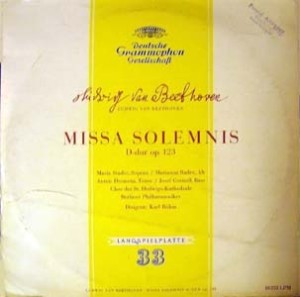 She also inspired Boris Papandopulo (1906 – 1991) to insert into his 2nd symphony the movement with a solo voice, and she also performed a line of songs leaving a considerable trace also on the concert stage, not only by the glaring interpretations of great masters of this format, but also by the performances of songs composed by the Croatian composers Blagoje Bersa (1873 – 1934), Boris Papandopulo, Jakov Gotovac and the like. One of the line of performing dirges, Seh dus dan (All Souls‘ Day) (1918) written by Blagoje Bersa, academician Nedjeljko Fabrio specifically wrote down: „Even today I hear in my consciousness the echo of the magistral interpretation of Marijana Radev and the romantic-impresionistic compositions with the refrain of the archaic accompanying sound from the kajkavian music.“
She also inspired Boris Papandopulo (1906 – 1991) to insert into his 2nd symphony the movement with a solo voice, and she also performed a line of songs leaving a considerable trace also on the concert stage, not only by the glaring interpretations of great masters of this format, but also by the performances of songs composed by the Croatian composers Blagoje Bersa (1873 – 1934), Boris Papandopulo, Jakov Gotovac and the like. One of the line of performing dirges, Seh dus dan (All Souls‘ Day) (1918) written by Blagoje Bersa, academician Nedjeljko Fabrio specifically wrote down: „Even today I hear in my consciousness the echo of the magistral interpretation of Marijana Radev and the romantic-impresionistic compositions with the refrain of the archaic accompanying sound from the kajkavian music.“
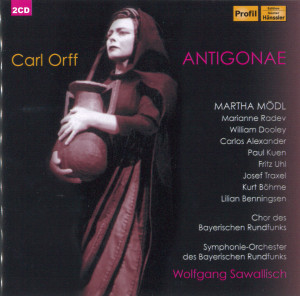 Marijana Radev also manifested her specific, almost eruptive gift and temperament in her performances of the then current compositions with the characteristics of the avant garde like, for instance, there were the Epitaph (1960) written by Milko Kelemen (1924) for mezzo-soprano, viola and percussion, Barasou for alto and instrumental ensemble (1971) composed by Branimir Sakac (1918 – 1979), or the Giraudoux-cantata for alto and orchestra written by Rolf Liebermann (Music Bienalle Zagreb, 1963) and Siebengesang by Heinz Holliger (MBZ 1969).
Marijana Radev also manifested her specific, almost eruptive gift and temperament in her performances of the then current compositions with the characteristics of the avant garde like, for instance, there were the Epitaph (1960) written by Milko Kelemen (1924) for mezzo-soprano, viola and percussion, Barasou for alto and instrumental ensemble (1971) composed by Branimir Sakac (1918 – 1979), or the Giraudoux-cantata for alto and orchestra written by Rolf Liebermann (Music Bienalle Zagreb, 1963) and Siebengesang by Heinz Holliger (MBZ 1969).
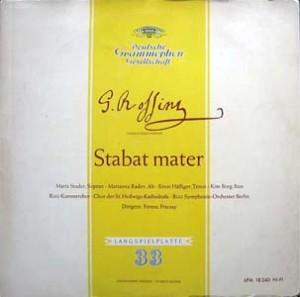 However, despite all of this splendid musical treasure there are only few tonal records, more abroad than in the homeland. This means that except for the deep bow before the reminiscence for this great artist on the occasion of the 100th anniversary of her birth there remains a debt that in any way we should preserve, as much as possible, this invaluable artistic heritage, before the pitiless oblivion is going to cover their precious trace.Luckily, part of her interpretations was recorded in editions abroad, like: from the concert repertoire Requiem by G. Verdi and Stabat Mater by G. Rossini, often with her associate, conductor Ferenz Friscay, Missa solemnis by L. van Beethoven with the Berlin Philharmonic under the baton of Karl Böhm. From the operatic repertoire live recordings were published with the performances of the operas: Queen of Spades by P.I. Tchaikovsky with the ensemble of the opera La Scala in Milan (performance 1961) and Mazeppa of the same composer, with the ensemble of the Festival Maggio musicale fiorentino (performance 1954), Antigona by Orff with Wolfgang Sawallisch, etc.
However, despite all of this splendid musical treasure there are only few tonal records, more abroad than in the homeland. This means that except for the deep bow before the reminiscence for this great artist on the occasion of the 100th anniversary of her birth there remains a debt that in any way we should preserve, as much as possible, this invaluable artistic heritage, before the pitiless oblivion is going to cover their precious trace.Luckily, part of her interpretations was recorded in editions abroad, like: from the concert repertoire Requiem by G. Verdi and Stabat Mater by G. Rossini, often with her associate, conductor Ferenz Friscay, Missa solemnis by L. van Beethoven with the Berlin Philharmonic under the baton of Karl Böhm. From the operatic repertoire live recordings were published with the performances of the operas: Queen of Spades by P.I. Tchaikovsky with the ensemble of the opera La Scala in Milan (performance 1961) and Mazeppa of the same composer, with the ensemble of the Festival Maggio musicale fiorentino (performance 1954), Antigona by Orff with Wolfgang Sawallisch, etc.
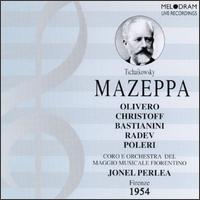 Many chroniclers described the specific, dark nuanced beauty of her voice with marvelous emphatic possibility. However, the wonder of interpretation happens only when this beauty gets ennobled by the own spiritual contents. In the faultless interaction between the vocal possibilities of emotional richness and skill there is Marijana Radev’s artistic horizon. Her imposing physiognomy reflected this spiritual world of the singer, reflecting a distinct personality which marked every interpretation as a synthesis of all knowledge built into her preparing.
Many chroniclers described the specific, dark nuanced beauty of her voice with marvelous emphatic possibility. However, the wonder of interpretation happens only when this beauty gets ennobled by the own spiritual contents. In the faultless interaction between the vocal possibilities of emotional richness and skill there is Marijana Radev’s artistic horizon. Her imposing physiognomy reflected this spiritual world of the singer, reflecting a distinct personality which marked every interpretation as a synthesis of all knowledge built into her preparing.
Unique and extraordinary, always identitly emphatic, unponderable and exemplary in whatever she was doing, Marijana Radev represents a part of the Croatian music that is unmeasurable with known examples. She is the God’s gift on the Croatian musical horizon and as such she should be remembered forever.
Erika Krpan
Und Dank an Ivan Mirnik, der die CD-Ausgabe zu Marijana Radev besorgte und mich darauf aufmerksam machte, so wie er stets dafür sorgt, dass man Kroatien als Kulturland nicht vergisst!

